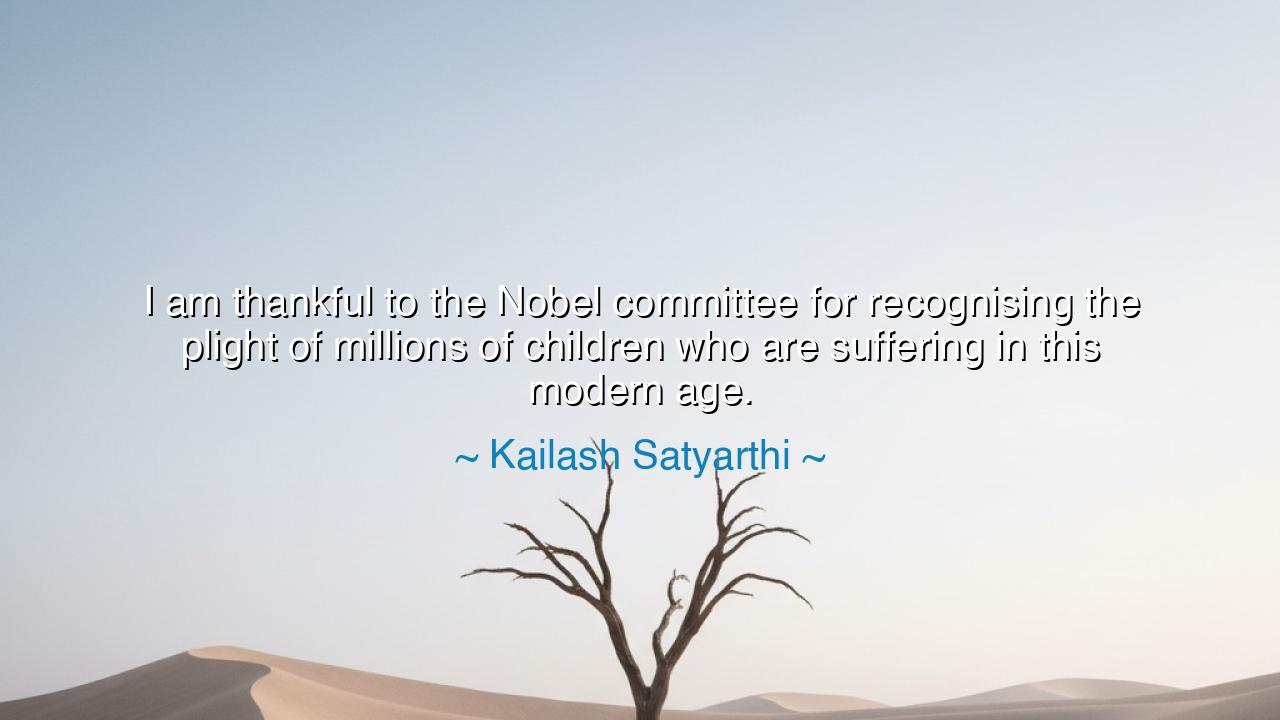
I am thankful to the Nobel committee for recognising the plight
I am thankful to the Nobel committee for recognising the plight of millions of children who are suffering in this modern age.






When Kailash Satyarthi proclaims, “I am thankful to the Nobel committee for recognising the plight of millions of children who are suffering in this modern age,” he speaks not merely of an honor bestowed upon him, but of a light cast upon the forgotten and the voiceless. His words remind us that the true measure of an award is not in the prestige of the laureate, but in the cause it elevates. Here, his gratitude is not self-serving; it is the gratitude of a man who has battled against the chains of child labor and exploitation, now rejoicing that the world is compelled to see what had long been hidden in the shadows.
At the heart of his statement is the plight of millions of children—innocent souls robbed of play, of education, of freedom. In the modern age, where humanity boasts of progress and enlightenment, it is a searing truth that so many young lives are still shackled to misery. Satyarthi’s thankfulness is not for recognition of himself, but for recognition of this wound in the human spirit. By honoring him, the Nobel committee also cast honor upon the children whose cries too often go unheard.
History is filled with similar moments, where one man’s honor was used as a vessel to highlight a greater cause. Consider Martin Luther King Jr., who upon receiving the Nobel Peace Prize declared that it was not a personal tribute, but “a profound recognition that nonviolence is the answer to the crucial political and moral question of our time.” Like King, Satyarthi uses the spotlight not to glorify himself, but to illuminate injustice, to remind the world that suffering persists even amid progress. The origin of his gratitude is rooted in this higher vision.
His words also teach us about the power of recognition. A cause may be noble, a struggle may be righteous, but without the eyes of the world turned upon it, it risks fading into silence. The Nobel Prize became not only Satyarthi’s honor, but a trumpet blast, shaking the consciences of leaders, communities, and individuals alike. His thankfulness is directed toward this transformation of silence into speech, of obscurity into visibility. For in the recognition of suffering begins the possibility of healing.
Yet, let us not forget the humility embedded in his declaration. He does not claim to have ended the plight of children, nor to have carried the burden alone. Instead, he acknowledges the children, the victims, as the true center of the story. His gratitude reflects the ancient virtue of the servant-leader, one who sees himself not as the hero, but as the vessel through which the suffering of the vulnerable may be heard.
From this we learn a profound lesson: when recognition or success comes, let us turn it outward, using it not to build our own towers but to lift up others. In our own lives, whenever we achieve, let us ask: “Whose cause can I honor with this moment? Whose voice can I amplify?” Just as Satyarthi honored the children, so can we honor the overlooked in our own communities—those struggling in silence, those whose suffering is unseen.
Practical action flows from this wisdom: look for those around you whose pain or plight is ignored. Speak for them, advocate for them, support them. Use your influence—no matter how small—to highlight justice, compassion, and humanity. And when gratitude is upon your lips, let it be for the chance to make a difference in the lives of others, not merely for your own gain.
Thus, Satyarthi’s teaching becomes eternal: the greatest thankfulness is not for honor itself, but for the opportunity to transform honor into service. Let us remember that in every age, the plight of the vulnerable remains a measure of our humanity. To recognize, to embrace, and to act—this is how we honor the suffering, and this is how we become worthy of the world we claim to build.






AAdministratorAdministrator
Welcome, honored guests. Please leave a comment, we will respond soon